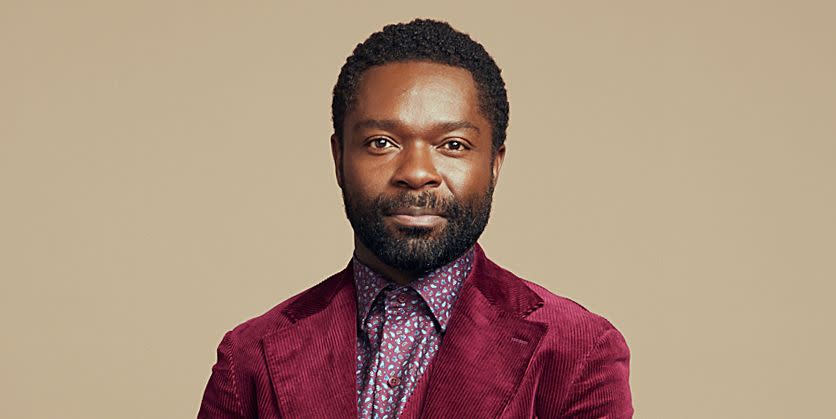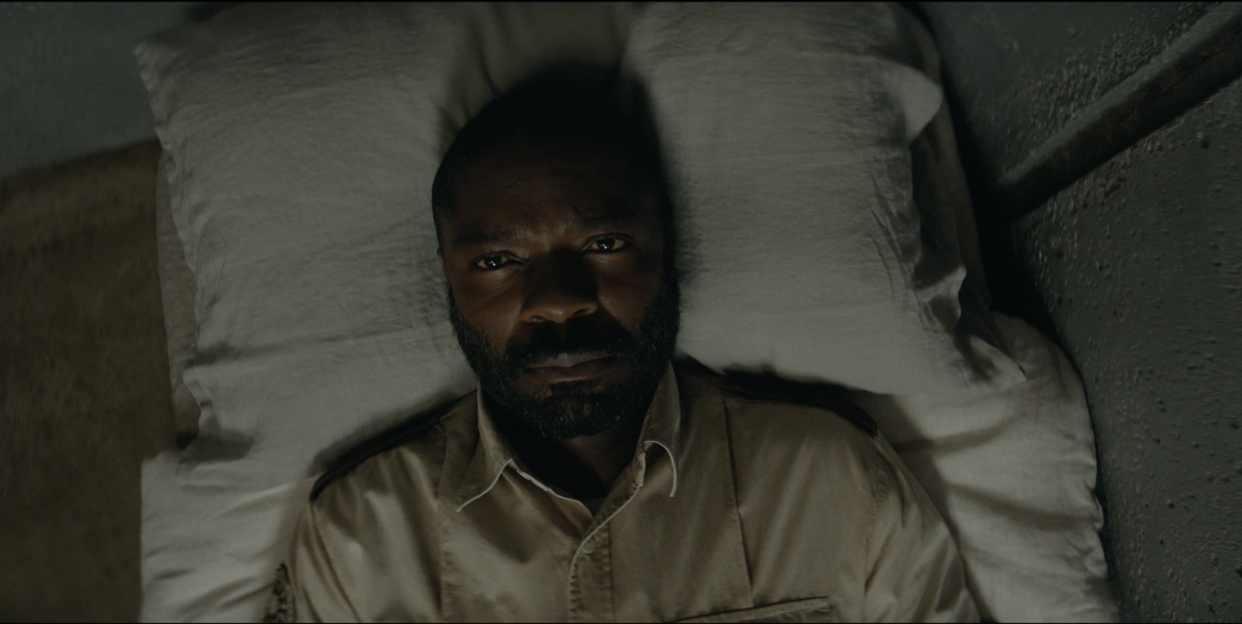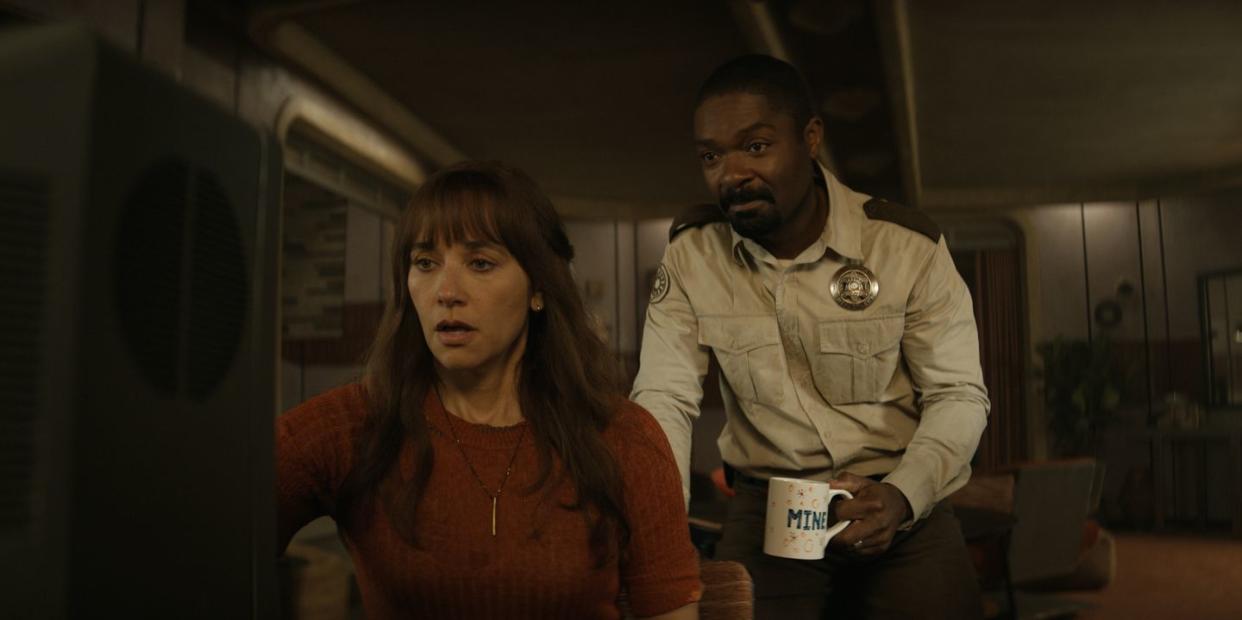There’s a New Sheriff in TV-Land: David Oyelowo

There's two new sheriffs in town, and there's room enough for both of them. Both played by David Oyelowo in separate series—one from our nation's history and another far into a dystopian future—the 47-year-old British actor is holding down the law. Oyelowo, known best for his portrayal of Martin Luther King Jr. in 2014's Selma, currently stars as Sheriff Holston in Apple TV+'s adaptation of Hugh Howey's celebrated sci-fi novel, Silo. Later in the year, he'll (very likely) don an actual sheriff's hat in Paramount's Bass Reeves, the real-life story of the first Black U.S. deputy marshal west of the Mississippi River.
In Silo, Oyelowo watches over a post-apocalyptic, underground structure that holds 10,000 people. Humanity is forced to live in a massive silo because the air outside is toxic—killing anyone who breathes it in within a matter of minutes. Or have the overlords of the silo have been lying? A great mystery, of course, ensues. Silo is the latest dystopian tale to hit the streaming wars, picking up the baton from Hulu's The Handmaid's Tale and HBO's The Last of Us. Maybe it's a certain pandemic that still has us all in an existential tailspin.
"What I love is the fact that we were doing something contemporaneous that speaks to the now, in terms of some of the themes, and I think that's what great television does," Oyelowo tells me over Zoom. He's calling from a remarkably well-lit room in Fort Worth, Texas, where he's currently filming Bass Reeves. But for right now, our minds are still deep in the world of Silo. "When you watch, there are so many things that are pertinent in relation to what you are watching on the news today," he says. "To be a human being is to have to come to terms with the fact that your time here is finite. Shows that heighten that fact all speak to the reality of our own existence—and how high the stakes become as a result."
Here, Oyelowo dives even further down into the depths of the silo—sharing his reaction to a big twist in Silo's second episode, how he avoided the pressure to follow up Selma, and why he wanted to work with Yellowstone creator Taylor Sheridan on Bass Reeves.

ESQUIRE: If you were in the silo in real life—as David Oyelowo and not Sheriff Holston—what would your job be?
DAVID OYELOWO: Oh, wow. That's a really good question. I'd love to be a tour guide, because it would be really quick. There's not much of it, so I would have really good hours and I could just go home and relax. The reality is that human beings are not designed to live underground. There are literal conditions that they've found that miners have—and people who spend a lot of time underground or without natural light—it's just not what we are designed to do. There are real reasons why it's not the most fun place on the planet.
They could use a good show to watch!
And some sun. [Laughs.]
What initially drew you Sheriff Holston?
It was the script. I found it to be truly compelling—and in a way, an insight into society. Yes, it's a sci-fi show, but I found so many aspects of it pertinent to a post-COVID world, where we've all had to ask existential questions. Then there was the ordinary, relatable, grounded nature of how the show starts. Holston and his wife, Allison, played by Rashida [Jones]—we meet them wanting to start a family, which is something a lot of people can relate to. But under these circumstances, it's a population-controlled environment. The stakes are through the roof when you are afforded the opportunity to try for a family, and then you're given a finite time within which to try and do that. So it's the combination of the ordinary and the extraordinary that really made this so attractive to me.
Do you think people will be surprised by your big twist at the end of Episode Two?
I hope people will be surprised. I certainly was when I read the scripts. And those surprises don't abate—I know what continues to happen deeper into the show. It's a very, very fragile existence. It poses a question, because the way things start to unravel in the silo is almost an argument for the authoritarian nature of the things that are in place. Because once these questions start being asked, you pull on that thread and it unspools pretty devastatingly.
Silo is unique in that different actors arrive at different points of the show to tell their story—as opposed to everyone appearing in Episode One, and appearing in every episode thereafter.
Not only is it intriguing, but it's incredibly satisfying for the audience—because the reality is you don't know who's about to come in, how long they're going to be there, how significant their character is, or when they're suddenly going to be jettisoned from the show. So it keeps the tension sky-high. It also means you're not having to do a ton of heavy lifting in the opening episodes. Beginning episodes can be like, OK, let's trudge through the mud to get to the good stuff. We don't do that with this. You are thrust into it and pulled on by the seat of your pants. You're right—that is something unique about the show, also one of the things that works best.

It feels like the rise of limited series and short-lived roles has allowed actors to have more creative freedom—since they're not tied down to a show for five, six seasons anymore.
100 percent. Anyone knows that doing the same thing over and over again for an extended period of time is not ideal. It's not ideal for the audience. It's not ideal if you're a creative person. I'm constantly looking for a new adventure, a new story to tell, and it's wonderful when you get to sit in it for a time and really tell that story. I'm here in Texas right now shooting Bass Reeves. We get to tell that over eight episodes—and this was an epic, epic life. Creatively, you want to be in a place whereby you are excited, you feel there's more story to tell, and the more finite that is, the more chance there is of the story remaining potent.
Did Sheridan fly you out to Texas? Wine and dine you?
I've known Taylor for a while now and what he has built is pretty impressive. I'm in Fort Worth, but that's not far away from his ranch where I watched 1883 being shot. We used some of those locations for Bass Reeves as well. He's really an inspiration in terms of what's possible when you have passion, when you have talent, and when you somehow have the energy that he has. So it's been a really great ride. He's someone who I'm very, very inspired by.
I remember, when the show was first announced, people were confused—they thought Bass Reeves was some Yellowstone character they forgot about. Of course, he was a real person in American history. Are you excited to share his story?
Yeah, I've been trying to get this one made for over eight years now—and I have Taylor to thank for rejuvenating the Western. It's understandable that people would think that because the Yellowstone universe continues to be built out—but this is a separate story and, as you say, a historical figure. But [Reeves] was inhabiting the same environment of Fort Smith and Fort Worth that the Duttons did in 1883, so it's an easy mistake to make. [Laughs.]
Did you ever feel pressure after Selma to chase more historically important roles?
Oh, no, quite the opposite. I was keen to run in the opposite direction. Your job as an actor—especially if you want to be one who sticks around for a while—is to keep the audience guessing. I got offered so many other historical figures, so many other civil rights stories after doing that. But that was the last thing I wanted to do, especially when you've played such a towering figure like Martin Luther King Jr. It's going to be one of the greatest things I do with my life. I knew that when we were doing it. I know that now. But as is the case with Silo, or now going off and doing a Western like Bass Reeves, I'm looking to just keep bringing the changes, challenge myself, and hopefully keep the audience invested.
You Might Also Like
